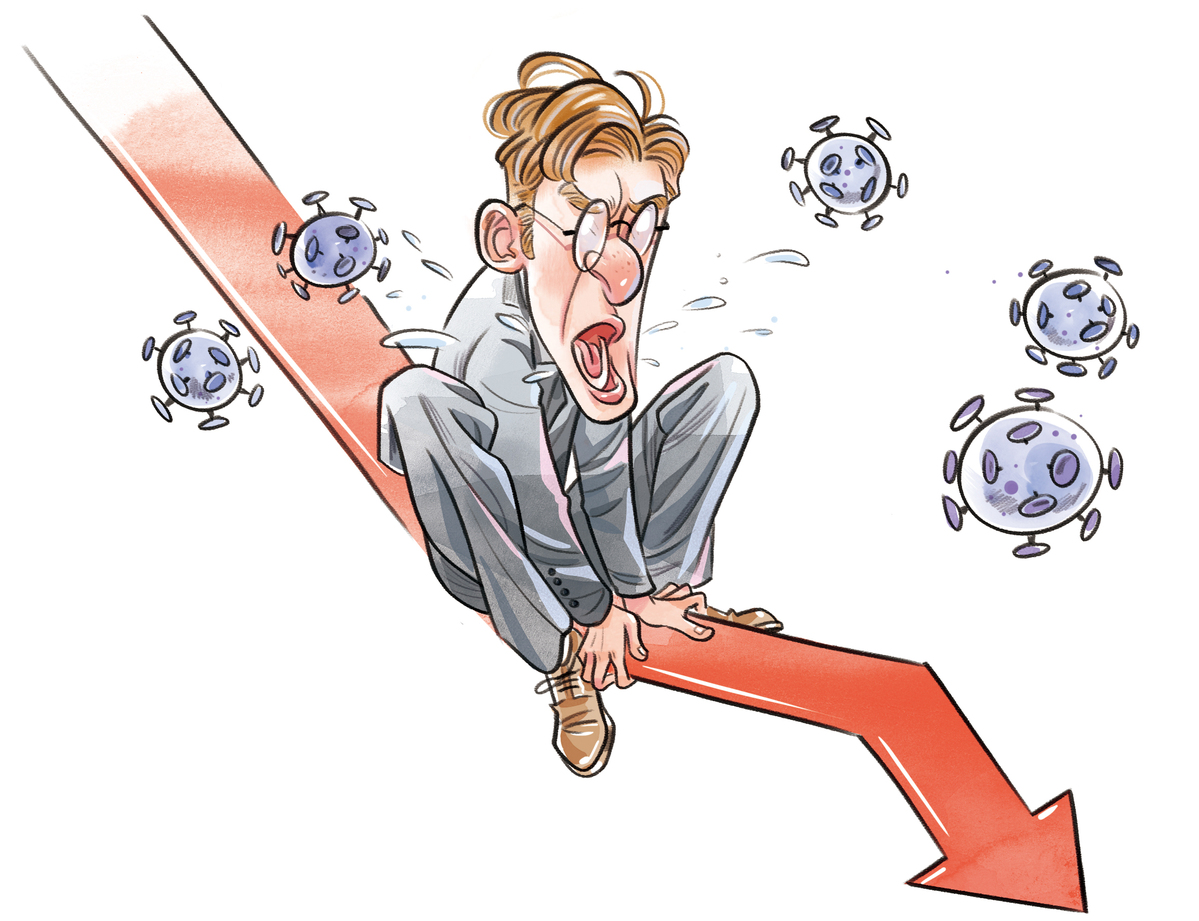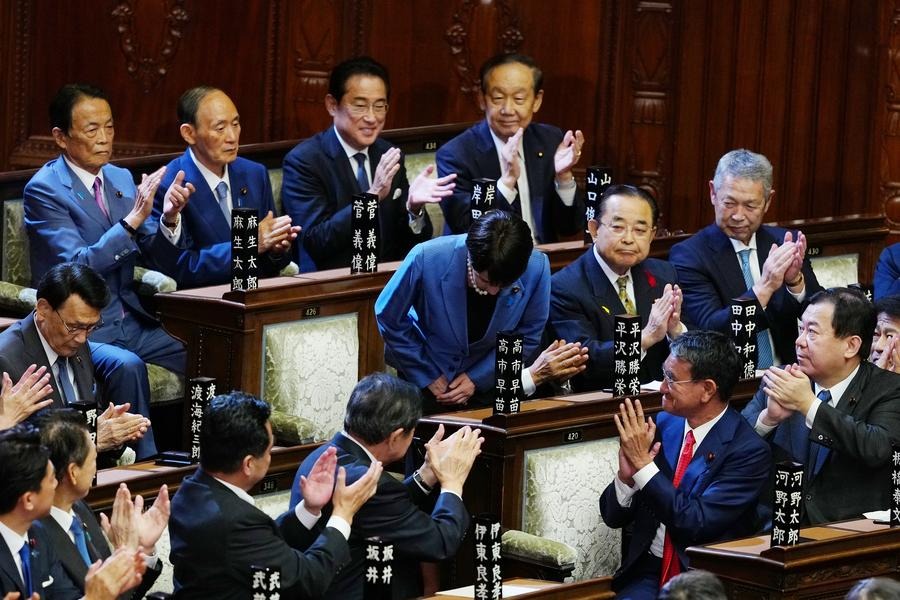US blame game puts innocent people at risk


A stealthy, highly contagious virus has caused a precipitous drop in the United States' stock market and sent shudders down the spine of a stalled economy. With factories and stores closing down, lights being dimmed from Broadway to Las Vegas, and hospitals overwhelmed with critically ill patients, the American mood is confused, resentful and laced with fear. Lockdowns of hard-hit areas and shelter-in-place orders for major cities are essential to contain the outbreak but add to the growing psychological stress.
Sadly for the human record, scapegoating often emerges from reaction to disaster. After the devastating Great Kanto earthquake of 1923, ethnic Korean residents of Tokyo were rumored to be a cause of trouble and were massacred in the thousands. The punishing economic conditions of Germany after World War I are frequently cited as a key factor leading to a rise in anti-Semitism so toxic and pervasive that they led to genocide.
There is hardly a nation on earth that has not been hit with the novel coronavirus, so international cooperation is essential. However, the tribal fears invoked in border barriers, lockdowns, shutdowns and quarantines have put the very project of globalization on the defensive. Thousands of planes have been idled, trains run empty and highways are free of cars, while the world's great tourist sites have turned into ghost towns.
Barriers of minds nastier than physical boundaries
Although there is a documented benefit to be found in social distancing and reduced flow of traffic, the introduction of border controls, travel shutdowns and the rise of physical barriers have been mirrored by the barriers developed in the minds and the wild imaginations of worried people everywhere.
Only scientists can definitively answer questions about the origin of the novel coronavirus, but the city of Wuhan, capital of Hubei province, is indelibly tied to public awareness of the disease because the first wave of the epidemic in China erupted there. Leaving aside the thorny question of where the microscopic novel coronavirus came from, most scientists consider it to have been a freaky but otherwise natural zoonotic transfer of virus from animal to man.
Wuhan was the first city to be hit by the microscopic invader on a massive scale. With more than 3,000 dead and tens of thousands ill, and millions more confined to their homes for the duration, the suffering and anguish of the people have been palpable.
Yet the regrettable human tendency to discriminate quickly gelled and took root, and the initial reaction of some people in China was to be wary of compatriots from Wuhan. By the same weak leap of logic, when the disease also emerged in Thailand, Japan, the Republic of Korea and other neighboring countries, the world began to turn a jaundiced eye to China.
Politicians have their own agendas and prejudices
A virus carries no passport-scientists and medical doctors know that better than anyone else-but politicians have their own agendas, and popular prejudice cannot be waved away with a magic wand. That's why international organizations such as the World Health Organization called on experienced medical professionals to assign a name to the disease that did not reflect on race or location.
COVID-19 is not a catchy term, but it contains information about the year of the outbreak and categorizes the pathogen as a new coronavirus.
By the time the official moniker was coined, the more general term "coronavirus" was in such widespread use that it has remained the default term for describing the novel coronavirus. Even if it lacks the precision of the official name, it is unobjectionable in social terms.
However, far from China's shores, other names were being concocted to describe the perilous pathogen, and terms such as "Wuhan flu" and "Wuhan coronavirus" (which was used by The New York Times) began to be bandied about. US Senator Tom Cotton from Arkansas throughout the crisis has made statements designed to inflame and arouse anti-China sentiment by blaming China for the virus. Although Cotton's hatred for China predates the outbreak and is rooted in a rigid anti-communist worldview, he has exploited the epidemic by conflating his political enemy with the hated virus.
Manipulative populism at play in United States
Despite the incendiary rhetoric of a few hot heads, references to the virus designed to indict China as a co-conspirator faded in February, and the mainstream media, The New York Times included, was careful to stick to the scientific term COVID-19 or the more general term, coronavirus. But in early March a new wave of stigmatizing language entered the American discourse by close associates of US President Donald Trump. Manipulative populism and playing to the hidden prejudice of a conservative political base came into play. It was no longer loud-mouth radio hosts and redneck politicians talking that way, and as such could not be easily dismissed.
US top diplomat, Secretary of State Mike Pompeo, started to use the terms "Wuhan virus" and "Chinese coronavirus" in official statements in the first week of March, giving political cover to closet racists anxious to pin blame on China.
Trump's two-month long pretense that the virus was nothing more than the common flu was finally shaken by an undeniable outbreak in the US.
Unwilling to take blame, Trump found it useful to deflect criticism away from his own negligence by making withering use of the term "foreign virus". This incendiary term came short of tagging China directly, but by then the narrative of presumptive guilt had been well established and his own supporters were bad-mouthing China with increasing frequency.
The US leader's use of the term "foreign virus" on March 11 was eagerly picked up by his political base, and social media use of the term "surged into the tens of millions" according to the Atlantic Council's Digital Forensic Research Lab.
Anti-Asian abuse and violence on the rise
Elsewhere, prejudice was becoming more overt. A White House aide joked about the China connection, telling CBS White House reporter Weijia Jiang that it was the "Kung Flu". Around the same time, reports on social media and elsewhere described an uptick in anti-Asian abuse and violence.
New Yorker writer Jiayang Fan reported in a tweet that she was accosted by a stranger using vile, racist language when she stepped out of her front door to take out the garbage. It left her feeling afraid to even walk down the street to go shopping.
Dozens, if not hundreds of such reports are now circulating on social media.
And it's only getting worse. The US president, for reasons best known to him, has been a credible defender of China on certain policy points and has generally resisted the vocal deprecations used by intemperate political advisers such as Stephen Miller, Peter Navarro, and Steve Bannon.
But looking weary in the face of mounting criticism of his failure to lead a national response to the pandemic, Trump suddenly joined the chorus of China-blamers as seen in this March 18 tweet from his official account:
"I always treated the Chinese Virus very seriously, and have done a very good job from the beginning, including my very early decision to close the 'borders' from China-against the wishes of almost all. Many lives were saved. The Fake News new narrative is disgraceful& false!"
When questioned about his injudicious use of "Chinese Virus" at a press conference later in the day, Trump doubled down in his use of the term. When Yamiche Alcindor of PBS asked him if using the term "Chinese virus" puts Asian-Americans at risk, Trump bristled: "No. Not at all. I think they would probably agree with it 100 percent. It comes from China."
The die is now cast for racial tensions to follow. Reasonable people can disagree with Beijing and its policies. Not everyone has to like Chinese food or Chinese culture. But it is inexcusable to blame a disease that knows no boundaries and afflicts all humans regardless of race or an ethnic group or a faraway nation.
This is intellectually dishonest, and it is a cheap shot to deflect blame and arouse populist support.
It is racist, it is wrong and ruling US politicians owe us all an apology.
The author is a media researcher covering Asia issues.
The views don't necessarily reflect those of China Daily.


































